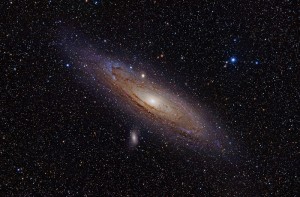
Where does light emitted from a flashlight go? On a universal scale, what happens to all the light?
If Space is not infinite, goes the line of incorrect reasoning, then all the light that has ever been radiated by stars and galaxies should make the Universe a blindingly bright place. Hence, the universe, based on this reasoning, must be infinite.
But, if the Universe is not infinite, the light should bounce back and forth, building up.
Most scientists consider the universe to be expanding, yet not infinite. So where does all the light go? First, let’s discuss what light actually is.
What Is It?
Light is a form of energy that radiates outward — radiant energy. Radiant energy can be readily absorbed, given the right conditions. By way of illustration: a person may enter a dining room and be surrounded by food he would greatly enjoy. Yet, unless that person actually opens his mouth and consumes it, all that food does him no good.
So it is with light. Most matter on earth exists in the form of molecules. Those molecules are composed of atoms. In turn, atoms are negative electrons orbiting positive centers. Radiant energy striking atoms may be absorbed by its electrons. However, not all of it is absorbed; only certain very specific frequencies or colors are.
Colors or Frequencies
When “white” light strikes a beet, many frequencies of the radiant energy are absorbed. However, since beets are red, we understand the frequencies that make up the color red are not absorbed. They bounce back and enter our eye. The same can be said for the orange of carrots, the green of grass, and the blue of a sapphire. This is because of certain “ground rules” dictated by the mathematical relations of physics.
The remaining light not absorbed by one type of bound electron is absorbed by those of another. It can also be absorbed by unbound electrons without frequency restriction. In this manner, light emitted over billions of years, does not accumulate — and thus brighten — the universe.
Where Does It Go?
It is absorbed and converted into other energy, “kinesis” or kinetic energy — manifested as motion, heat.
Note: You might also enjoy How the Electric Eel Produces Electricity
References:

I learned some things I did not know before. Incidentally, gold reflects all but blue light. That is what gives gold its distinguishing color. If you put gold under blue light it would disappear. Is this a test for gold?
It sounds like you’re trying to create some sort of “cloaking” device.
You know, it never even crossed my mind to wonder about this before! I just hope it doesn’t keep me awake tonight! I suppose if you look at it as energy, the laws of (thermodynamics?) say energy is neither created nor destroyed. I presume the amount of energy in the universe is constant no matter what size it is nor whether it is expanding, contracting or staying the same, so the light energy must be converted to something else? I suppose being flippant, I could say it encountered a black hole and was swallowed?
Ah, the article describes where it goes. Just as it can be emitted, it can be absorbed.